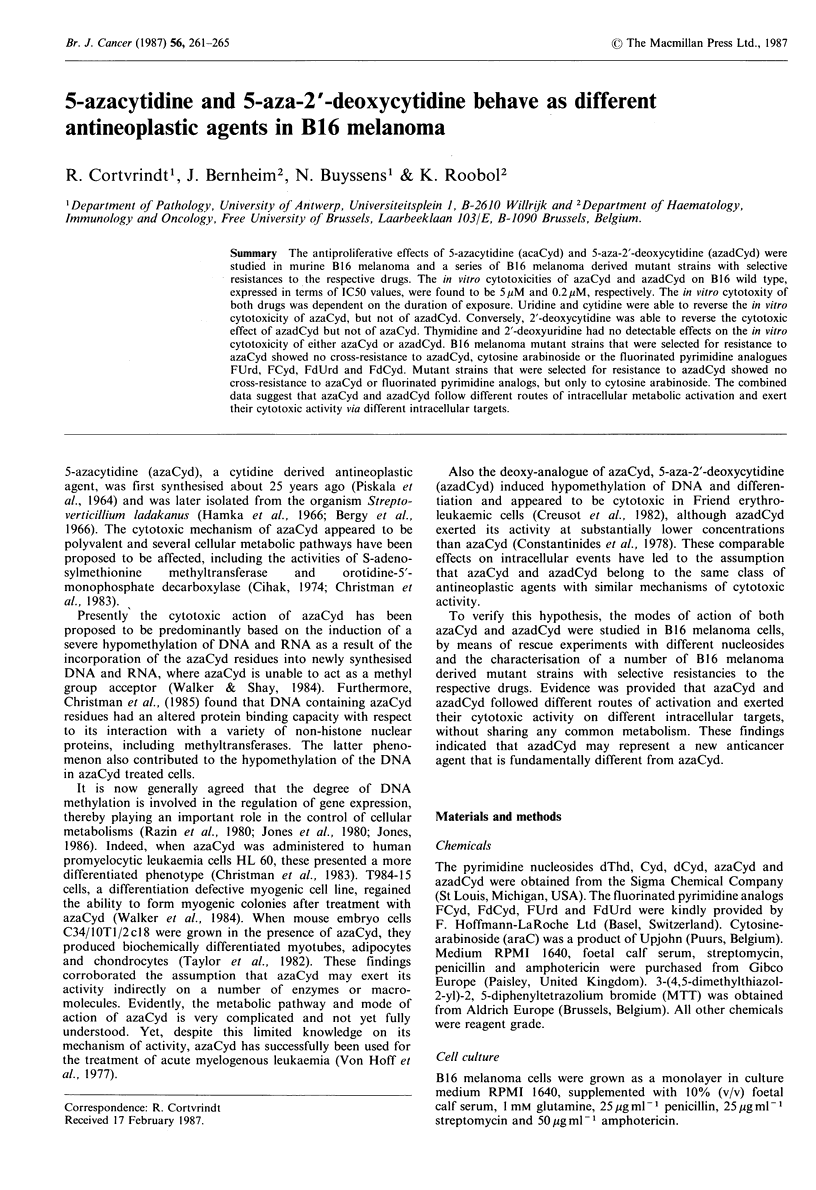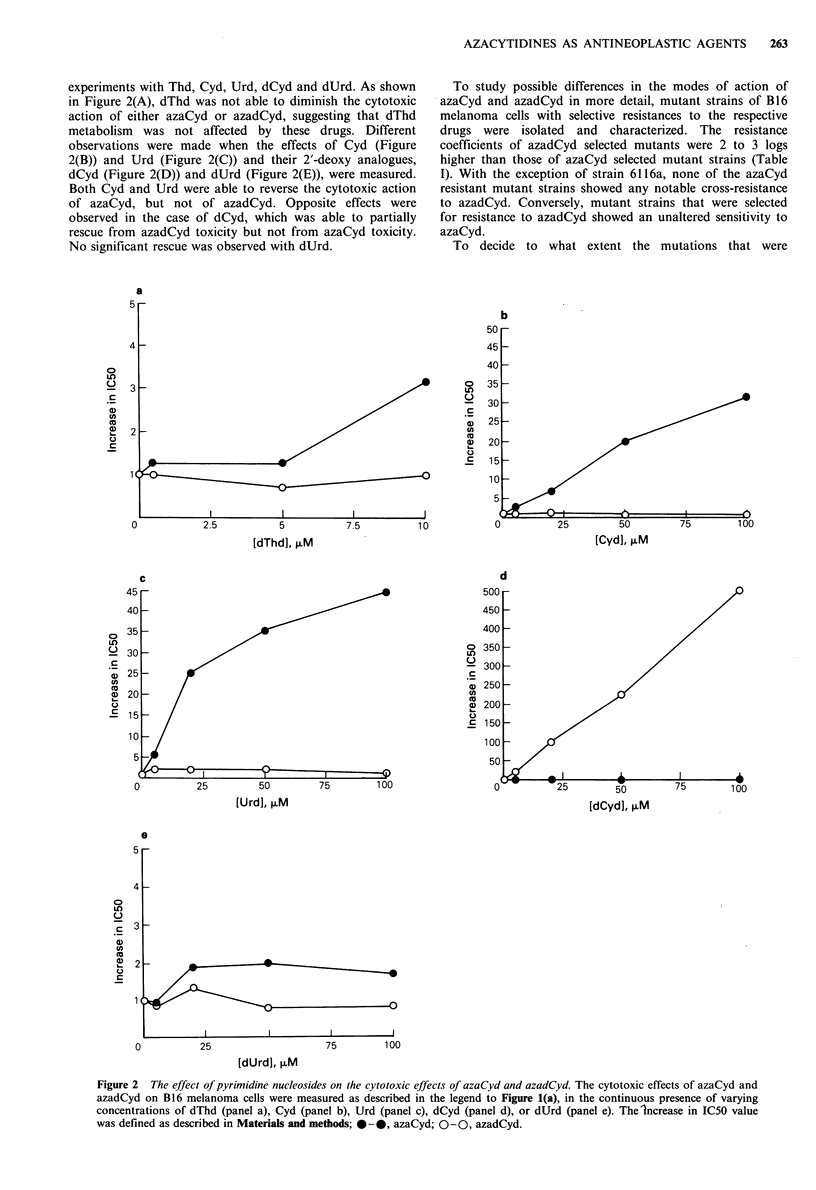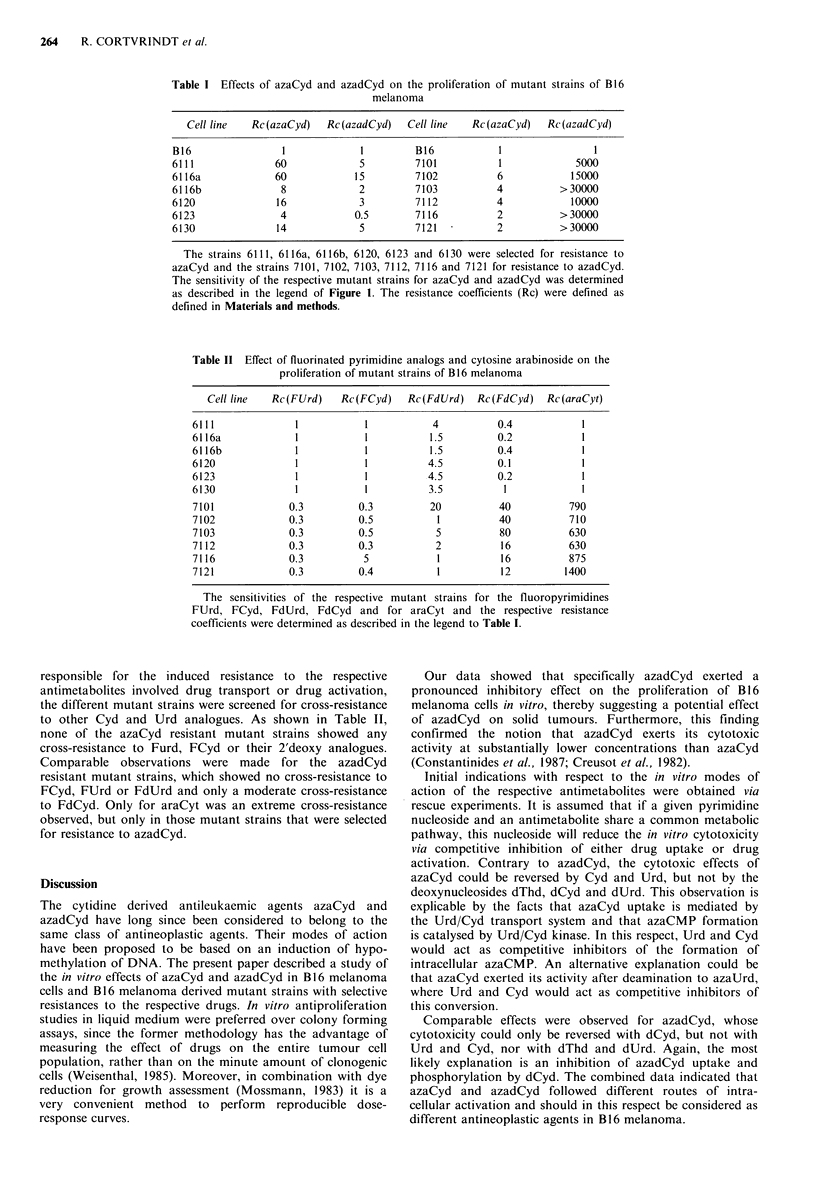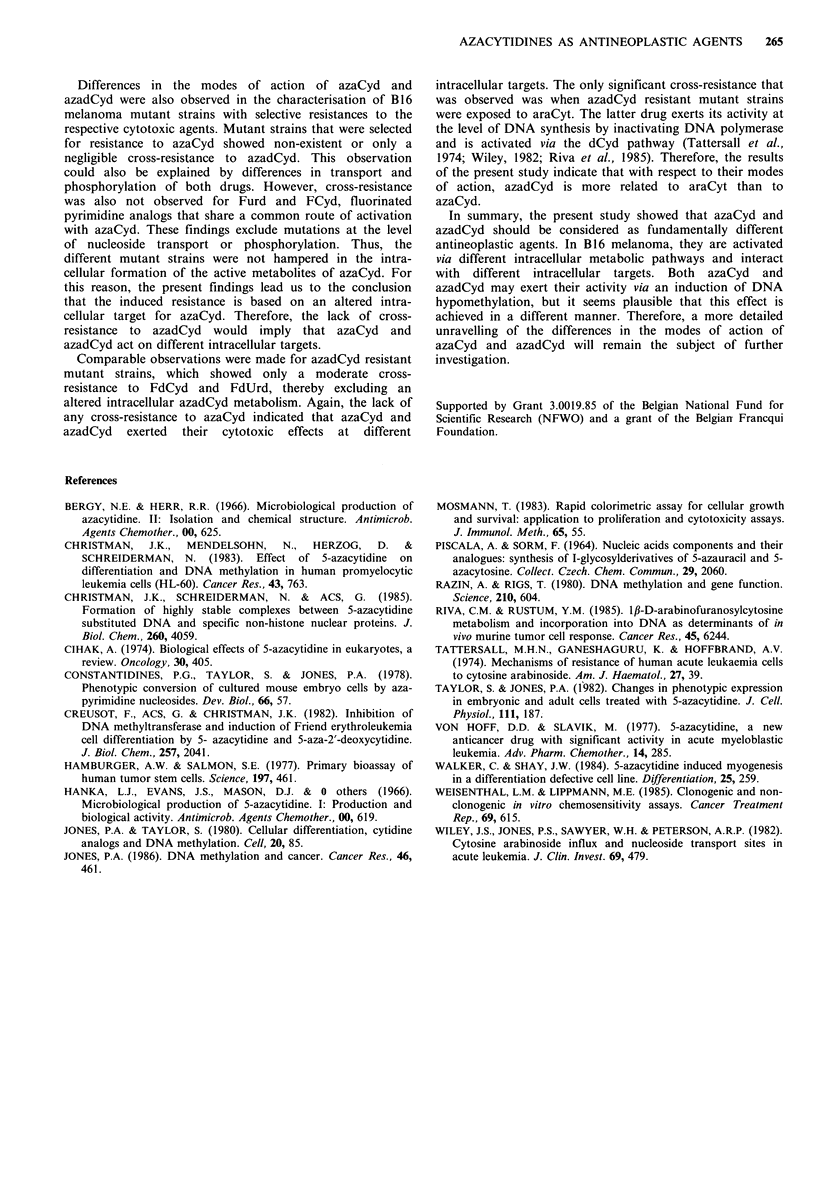Abstract
The antiproliferative effects of 5-azacytidine (acaCyd) and 5-aza-2'-deoxycytidine (azadCyd) were studied in murine B16 melanoma and a series of B16 melanoma derived mutant strains with selective resistances to the respective drugs. The in vitro cytotoxicities of azaCyd and azadCyd on B16 wild type, expressed in terms of IC50 values, were found to be 5 microM and 0.2 microM, respectively. The in vitro cytotoxicity of both drugs was dependent on the duration of exposure. Uridine and cytidine were able to reverse the in vitro cytotoxicity of azaCyd, but not of azadCyd. Conversely, 2'-deoxycytidine was able to reverse the cytotoxic effect of azadCyd but not of azaCyd. Thymidine and 2'-deoxyuridine had no detectable effects on the in vitro cytotoxicity of either azaCyd or azadCyd. B16 melanoma mutant strains that were selected for resistance to azaCyd showed no cross-resistance to azadCyd, cytosine arabinoside or the fluorinated pyrimidine analogues FUrd, FCyd, FdUrd and FdCyd. Mutant strains that were selected for resistance to azadCyd showed no cross-resistance to azaCyd or fluorinated pyrimidine analogs, but only to cytosine arabinoside. The combined data suggest that azaCyd and azadCyd follow different routes of intracellular metabolic activation and exert their cytotoxic activity via different intracellular targets.
Full text
PDF




Selected References
These references are in PubMed. This may not be the complete list of references from this article.
- Bergy M. E., Herr R. R. Microbiological production of 5-azacytidine. II. Isolation and chemical structure. Antimicrob Agents Chemother (Bethesda) 1966;6:625–630. doi: 10.1128/AAC.6.5.625. [DOI] [PubMed] [Google Scholar]
- Christman J. K., Mendelsohn N., Herzog D., Schneiderman N. Effect of 5-azacytidine on differentiation and DNA methylation in human promyelocytic leukemia cells (HL-60). Cancer Res. 1983 Feb;43(2):763–769. [PubMed] [Google Scholar]
- Christman J. K., Schneiderman N., Acs G. Formation of highly stable complexes between 5-azacytosine-substituted DNA and specific non-histone nuclear proteins. Implications for 5-azacytidine-mediated effects on DNA methylation and gene expression. J Biol Chem. 1985 Apr 10;260(7):4059–4068. [PubMed] [Google Scholar]
- Cihák A. Biological effects of 5-azacytidine in eukaryotes. Oncology. 1974;30(5):405–422. doi: 10.1159/000224981. [DOI] [PubMed] [Google Scholar]
- Constantinides P. G., Taylor S. M., Jones P. A. Phenotypic conversion of cultured mouse embryo cells by aza pyrimidine nucleosides. Dev Biol. 1978 Sep;66(1):57–71. doi: 10.1016/0012-1606(78)90273-7. [DOI] [PubMed] [Google Scholar]
- Creusot F., Acs G., Christman J. K. Inhibition of DNA methyltransferase and induction of Friend erythroleukemia cell differentiation by 5-azacytidine and 5-aza-2'-deoxycytidine. J Biol Chem. 1982 Feb 25;257(4):2041–2048. [PubMed] [Google Scholar]
- Hamburger A. W., Salmon S. E. Primary bioassay of human tumor stem cells. Science. 1977 Jul 29;197(4302):461–463. doi: 10.1126/science.560061. [DOI] [PubMed] [Google Scholar]
- Hanka L. J., Evans J. S., Mason D. J., Dietz A. Microbiological production of 5-azacytidine. I. Production and biological activity. Antimicrob Agents Chemother (Bethesda) 1966;6:619–624. [PubMed] [Google Scholar]
- Jones P. A. DNA methylation and cancer. Cancer Res. 1986 Feb;46(2):461–466. [PubMed] [Google Scholar]
- Jones P. A., Taylor S. M. Cellular differentiation, cytidine analogs and DNA methylation. Cell. 1980 May;20(1):85–93. doi: 10.1016/0092-8674(80)90237-8. [DOI] [PubMed] [Google Scholar]
- Mosmann T. Rapid colorimetric assay for cellular growth and survival: application to proliferation and cytotoxicity assays. J Immunol Methods. 1983 Dec 16;65(1-2):55–63. doi: 10.1016/0022-1759(83)90303-4. [DOI] [PubMed] [Google Scholar]
- Razin A., Riggs A. D. DNA methylation and gene function. Science. 1980 Nov 7;210(4470):604–610. doi: 10.1126/science.6254144. [DOI] [PubMed] [Google Scholar]
- Riva C. M., Rustum Y. M. 1-beta-D-arabinofuranosylcytosine metabolism and incorporation into DNA as determinants of in vivo murine tumor cell response. Cancer Res. 1985 Dec;45(12 Pt 1):6244–6249. [PubMed] [Google Scholar]
- Tattersall M. H., Ganeshaguru K., Hoffbrand A. V. Mechanisms of resistance of human acute leukaemia cells to cytosine arabinoside. Br J Haematol. 1974 May;27(1):39–46. doi: 10.1111/j.1365-2141.1974.tb06772.x. [DOI] [PubMed] [Google Scholar]
- Taylor S. M., Jones P. A. Changes in phenotypic expression in embryonic and adult cells treated with 5-azacytidine. J Cell Physiol. 1982 May;111(2):187–194. doi: 10.1002/jcp.1041110210. [DOI] [PubMed] [Google Scholar]
- Walker C., Shay J. W. 5-Azacytidine induced myogenesis in a differentiation defective cell line. Differentiation. 1984;25(3):259–263. doi: 10.1111/j.1432-0436.1984.tb01364.x. [DOI] [PubMed] [Google Scholar]
- Weisenthal L. M., Lippman M. E. Clonogenic and nonclonogenic in vitro chemosensitivity assays. Cancer Treat Rep. 1985 Jun;69(6):615–632. [PubMed] [Google Scholar]
- Wiley J. S., Jones S. P., Sawyer W. H., Paterson A. R. Cytosine arabinoside influx and nucleoside transport sites in acute leukemia. J Clin Invest. 1982 Feb;69(2):479–489. doi: 10.1172/JCI110472. [DOI] [PMC free article] [PubMed] [Google Scholar]
- von Hoff D. D., Slavik M. 5-azacytidine--a new anticancer drug with significant activity in acute myeloblastic leukemia. Adv Pharmacol Chemother. 1977;14:285–326. doi: 10.1016/s1054-3589(08)60190-8. [DOI] [PubMed] [Google Scholar]


